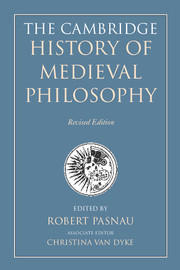Book contents
- Frontmatter
- Contents of Volume 1
- Preface
- List of contributors
- Frontmatter
- Contents of Volume 2
- Introduction
- I Fundamentals
- II Logic and language
- III Natural philosophy
- IV Soul and knowledge
- V Will and desire
- VI Ethics
- VII Political philosophy
- VIII Metaphysics
- IX Theology
- 50 Philosophy and theology
- 51 Faith and reason
- 52 Mysticism
- 53 Arguments for god’s existence
- 54 Describing god
- 55 Providence
- 56 The problem of evil
- Appendices
- Bibliography of primary sources
- Bibliography of secondary sources
- Index nominum
- Index rerum
- References
54 - Describing god
from IX - Theology
Published online by Cambridge University Press: 05 August 2014
- Frontmatter
- Contents of Volume 1
- Preface
- List of contributors
- Frontmatter
- Contents of Volume 2
- Introduction
- I Fundamentals
- II Logic and language
- III Natural philosophy
- IV Soul and knowledge
- V Will and desire
- VI Ethics
- VII Political philosophy
- VIII Metaphysics
- IX Theology
- 50 Philosophy and theology
- 51 Faith and reason
- 52 Mysticism
- 53 Arguments for god’s existence
- 54 Describing god
- 55 Providence
- 56 The problem of evil
- Appendices
- Bibliography of primary sources
- Bibliography of secondary sources
- Index nominum
- Index rerum
- References
Summary
The philosophical problem of describing God arises at the intersection of two different areas of inquiry. The word ‘describing’ makes it clear that the issue is in part a logical one – in the broad medieval sense of ‘logic,’ which includes semantics, the philosophy of language, and even some aspects of the theory of cognition. It is the problem, first, of forming an understanding of some extramental object and, second, of conveying that understanding by means of verbal signs. But the word ‘God’ also indicates that the logical problems involved in description are exacerbated, or perhaps that new problems arise, because of the nature of the extramental object that we are seeking to describe.
Given the enormous ingenuity with which logical problems were debated in the Middle Ages, it is not surprising that the problem of describing God would be worked out in detail – and that many thinkers would lose sight of the specifically theological context in which the problem was ostensibly set. We see here a familiar phenomenon. Once philosophers (even scholastic philosophers) have fully domesticated a problem, discussions of the problem seldom lay bare the practical urgency that alone made the question worth pursuing in the first place; it becomes a technical question, answerable by technical means. Yet, though it is not always in evidence, the practical upshot of the issue is never entirely forgotten, as John Duns Scotus reminds us in his curt dismissal of the view that we can at best say of God what he is not: “We do not have supreme love for negations” (Ordinatio I.3.1.1–2 n. 10).
- Type
- Chapter
- Information
- The Cambridge History of Medieval Philosophy , pp. 749 - 760Publisher: Cambridge University PressPrint publication year: 2014



